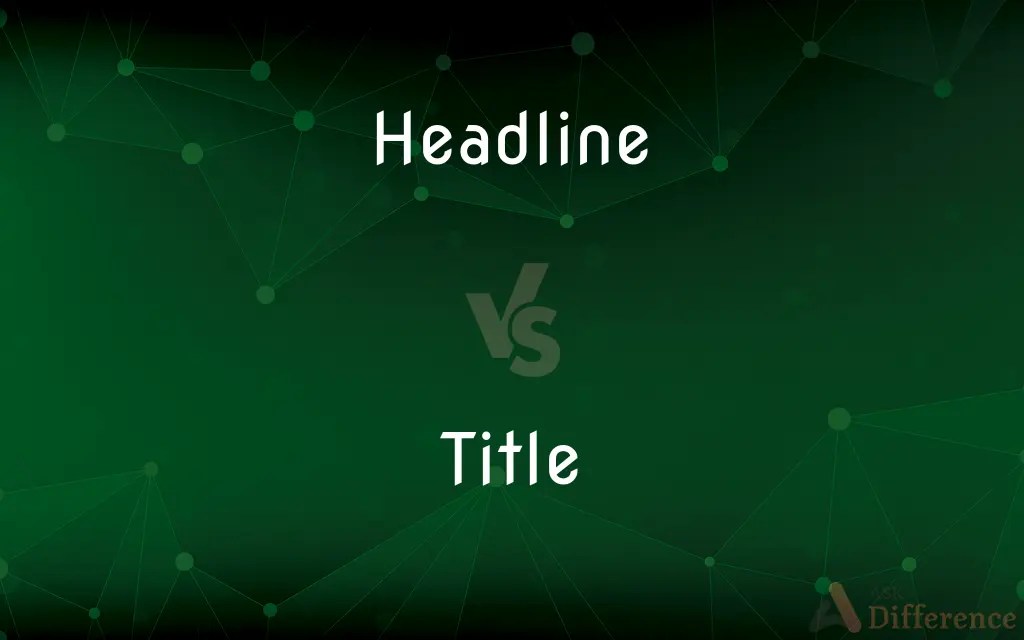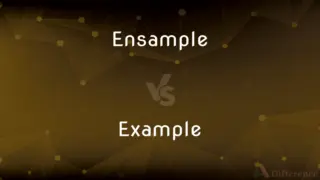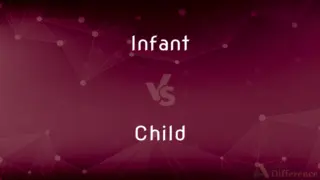Headline vs. Title — What's the Difference?
Edited by Tayyaba Rehman — By Maham Liaqat — Updated on March 11, 2024
A headline aims to attract readers' attention to news articles, while a title identifies and summarizes the content of books, articles, or papers.

Difference Between Headline and Title
Table of Contents
ADVERTISEMENT
Key Differences
Headlines and titles both serve as introductory text, but they fulfill different roles based on their context. A headline, often found in newspapers and online articles, is designed to capture attention and entice readers into reading the content. It is usually brief, engaging, and sometimes sensational. On the other hand, a title is used to name or identify a book, article, movie, or other works. Titles aim to summarize the content or theme succinctly and accurately, providing potential readers or viewers with insight into the work's nature.
The crafting of headlines is an art form geared towards maximizing reader engagement and curiosity. Headlines often use powerful language, active voice, and sometimes include puns, wordplay, or emotional appeals to draw in readers. Titles, while they can also be creative, primarily focus on clarity, relevance, and the encapsulation of the main theme or subject of the work. This difference underscores the unique purposes each serves: headlines to attract and titles to inform.
In terms of structure, headlines are typically shorter and more dynamic than titles. They may omit certain details like the subject's name or location if it makes the headline more compelling. Titles, however, generally provide a more comprehensive overview of the work’s content and are less likely to omit crucial information for the sake of brevity or intrigue.
Headlines are particularly important in the context of news media, where the goal is to capture immediate attention in a competitive information landscape. Titles, while still significant in marketing books, films, or academic papers, serve a broader purpose of identification and reference over time, rather than immediate engagement.
Despite these differences, both headlines and titles are crucial in guiding readers' expectations and interest. They must be carefully crafted to fulfill their respective roles effectively, whether that is to intrigue and attract or to inform and summarize.
ADVERTISEMENT
Comparison Chart
Purpose
To attract readers' attention to news articles.
To identify and summarize the content of a work.
Context
Newspapers, online articles, and news broadcasts.
Books, articles, movies, and other works.
Language Style
Engaging, sometimes sensational or provocative.
Clear, informative, and reflective of the content.
Length
Typically shorter and more dynamic.
Generally more comprehensive and descriptive.
Focus
Maximizing reader engagement and curiosity.
Providing insight into the work’s theme or subject.
Compare with Definitions
Headline
A brief, attention-grabbing statement used to summarize news articles.
Global Markets Rally on New Economic Policy.
Title
The name of a book, article, movie, or other work that summarizes its content.
The Great Gatsby: America's Literary Classic.
Headline
Tailored for immediate impact in a competitive information landscape.
Election Upset: Underdog Candidate Wins Presidency.
Title
Serves as a long-term identifier and reference.
Pride and Prejudice: A Classic Tale of Love and Misunderstanding.
Headline
Can include puns, wordplay, or emotional appeals.
High and Dry: The State of Our Water Crisis.
Title
Focuses on clarity, relevance, and encapsulation of the main theme.
A Brief History of Time: From the Big Bang to Black Holes.
Headline
Designed to entice readers to engage with the content.
Unbelievable Discovery: Scientists Reverse Aging.
Title
Can be creative but prioritizes informative content.
To destroy a Mockingbird: A Story of Justice and Morality.
Headline
Often uses active voice and powerful language.
Hurricane Devastates Coastal Town: Thousands Evacuated.
Title
Aims to provide potential readers or viewers with insight into the work’s nature.
Silent Spring: The Environmental Movement’s Wake-up Call.
Headline
The headline or heading is the text indicating the nature of the article below it. The large type front page headline did not come into use until the late 19th century when increased competition between newspapers led to the use of attention-getting headlines.
Title
A title is one or more words used before or after a person's name, in certain contexts. It may signify either generation, an official position, or a professional or academic qualification.
Headline
The title or heading of an article, especially in a newspaper, usually set in large type.
Title
The name of a book, composition, or other artistic work
The author and title of the book
Headline
Often headlines An important or sensational piece of news.
Title
A name that describes someone's position or job
Leese assumed the title of director general
Headline
A line at the head of a page or passage giving information such as the title, author, and page number.
Title
The position of being the champion of a major sports competition
Davis won the world title for the first time in 1981
Headline
To supply (a page or passage) with a headline.
Title
A right or claim to the ownership of property or to a rank or throne
The buyer acquires a good title to the goods
A grocery family had title to the property
Headline
To present or promote as a headliner
The Palace Theater headlines a magician.
Title
(in church use) a fixed sphere of work and source of income as a condition for ordination.
Headline
To serve as the headliner of
He headlines the bill.
Title
Give a name to (a book, composition, or other work)
A report titled The Lost Land
Headline
(journalism) The heading or title of a magazine or newspaper article.
The headline on today's newspaper reads "John Doe Wins Wood-Splitting Competition."
Title
An identifying name given to a book, play, film, musical composition, or other work.
Headline
The line at the top of a page containing the folio or number of the page.
Title
A general or descriptive heading, as of a book chapter.
Headline
(entertainment) The top-billed attraction.
Title
A written work that is published or about to be published
The titles in the publisher's fall catalog.
Headline
(nautical) A headrope.
Title
A division of a legal code, generally consisting of multiple related statutes.
Headline
To give a headline to a page or section of a text.
Title
Often titles Written material to be read by viewers that is included in a film or television show, typically presenting credits, narration, or dialogue.
Headline
To present as the main attraction; to have top billing, to be the main attraction.
Title
A written piece of translated dialogue superimposed at the bottom of the frame during a film; a subtitle.
Headline
The line at the head or top of a page.
Title
A formal appellation attached to the name of a person as a sign of office, rank, profession, or hereditary privilege.
Headline
See Headrope.
Title
A descriptive name; an epithet
The dubious title of the worst bowler in the league.
Headline
A title for an article in a newspaper, sometimes one line, sometimes more, set in larger and bolder type than the body of the article and indicating the subject matter or content of the article.
Title
A right or claim, or the basis of a right or claim
"The weight of a fish is commonly its only title to fame" (Henry David Thoreau).
Headline
A similar title at the top of the newspaper indicating the most important story of the day; also, a title for an illustration or picture.
Title
A form of ownership free of valid claims by other parties.
Headline
To mention in a headline.
Title
The aggregate evidence that gives rise to a legal right of possession or control.
Headline
To furnish with a headline (senses 1, 3, or 4).
Title
The instrument, such as a deed, that constitutes this evidence.
Headline
To publicise prominently in an advertisement.
Title
Sports & Games A championship
Which boxer won the heavyweight title?.
Headline
The heading or caption of a newspaper article
Title
A source of income or area of work required of a candidate for ordination in the Church of England.
Headline
Publicize widely or highly, as if with a headline
Title
A Roman Catholic church in or near Rome having a cardinal for its nominal head.
Headline
Provide (a newspaper page or a story) with a headline
Title
To give a name or title to.
Title
An appellation given to a person or family to signify either veneration, official position, social rank, the possession of assets or properties, or a professional or academic qualification. See also :Category:Titles
Title
(property law) Legal right to ownership of a property; a deed or other certificate proving this.
A good title to an estate, or an imperfect title
Title
In canon law, that by which a beneficiary holds a benefice.
Title
A church to which a priest was ordained, and where he was to reside.
Title
The name of a book, film, musical piece, painting, or other work of art.
I know the singer's name, but not the title of the song.
Title
A publication.
The retailer carries thousands of titles.
Buyers of the new video game console can choose from three bundled titles.
Title
A section or division of a subject, as of a law or a book.
Title
A written title, credit, or caption shown with a film, video, or performance.
The titles scrolled by too quickly to read.
Title
(bookbinding) The panel for the name, between the bands of the back of a book.
Title
The subject of a writing; a short phrase that summarizes the entire topic.
Title
A division of an act of law
Title II of the USA PATRIOT Act
Title
(sports) The recognition given to the winner of a championship in sports.
Title
A long title.
Title
A short title.
Title
(transitive) To assign a title to; to entitle.
Title
An inscription put over or upon anything as a name by which it is known.
Title
The inscription in the beginning of a book, usually containing the subject of the work, the author's and publisher's names, the date, etc.
Title
The panel for the name, between the bands of the back of a book.
Title
A section or division of a subject, as of a law, a book, specif. (Roman & Canon Laws), a chapter or division of a law book.
Title
An appellation of dignity, distinction, or preëminence (hereditary or acquired), given to persons, as duke marquis, honorable, esquire, etc.
With his former title greet Macbeth.
Title
A name; an appellation; a designation.
Title
That which constitutes a just cause of exclusive possession; that which is the foundation of ownership of property, real or personal; a right; as, a good title to an estate, or an imperfect title.
Title
A church to which a priest was ordained, and where he was to reside.
Title
To call by a title; to name; to entitle.
Hadrian, having quieted the island, took it for honor to be titled on his coin, "The Restorer of Britain."
Title
A heading that names a statute or legislative bill; may give a brief summary of the matters it deals with;
Title 8 provided federal help for schools
Title
The name of a work of art or literary composition etc.;
He looked for books with the word `jazz' in the title
He refused to give titles to his paintings
I can never remember movie titles
Title
A general or descriptive heading for a section of a written work;
The novel had chapter titles
Title
The status of being a champion;
He held the title for two years
Title
A legal document signed and sealed and delivered to effect a transfer of property and to show the legal right to possess it;
He signed the deed
He kept the title to his car in the glove compartment
Title
An identifying appellation signifying status or function: e.g. Mr. or General;
The professor didn't like his friends to use his formal title
Title
An established or recognized right;
A strong legal claim to the property
He had no documents confirming his title to his father's estate
He staked his claim
Title
(usually plural) written material introduced into a movie or TV show to give credits or represent dialogue or explain an action;
The titles go by faster than I can read
Title
An appellation signifying nobility;
`your majesty' is the appropriate title to use in addressing a king
Title
An informal right to something;
His claim on her attentions
His title to fame
Title
Give a title to
Title
Designate by an identifying term;
They styled their nation `The Confederate States'
Common Curiosities
Can a title be considered a headline?
While a title serves a different purpose by summarizing and identifying a work, in some contexts, such as online articles, the terms can be used interchangeably, though their underlying intentions differ.
Why are headlines important in news media?
Headlines are crucial in news media because they provide the first impression and play a key role in engaging readers in a competitive information landscape.
What is the main purpose of a headline?
The main purpose of a headline is to attract readers' attention and entice them to read the accompanying news article.
How does a title differ from a headline?
A title identifies and summarizes the content of a work, such as a book or movie, focusing on clarity and relevance, whereas a headline aims to capture immediate attention with engaging and sometimes sensational language.
Are headlines more important than the content of the article?
While headlines are critical for attracting readers, the content of the article is ultimately what delivers value and information, making both elements important for different reasons.
Are there any legal considerations in creating headlines?
Yes, headlines must not infringe on copyrights, propagate libel, or mislead readers, adhering to legal and ethical standards.
How do digital platforms affect the creation of headlines and titles?
Digital platforms often emphasize SEO (Search Engine Optimization) and shareability, influencing the creation of headlines and titles to ensure they are discoverable and engaging on social media.
How should a good headline or title be crafted?
A good headline should be engaging, concise, and reflective of the content to maximize reader interest, while a good title should accurately summarize the work’s theme or subject in a clear and informative manner.
Can a work have both a headline and a title?
Yes, in some cases, such as online articles or blog posts, the main title can serve as a headline, especially if it's designed to attract attention and summarize the content.
Can headlines be misleading?
Yes, headlines can sometimes be misleading if they prioritize sensationalism over accuracy to attract readers, a practice often criticized and termed as "clickbait."
Do titles have a role in marketing a work?
Absolutely, titles play a significant role in marketing by providing potential readers or viewers with insight into the content, theme, or genre of the work, influencing their decision to engage with it.
Can the style of headlines or titles change over time?
The style and conventions of headlines and titles evolve with language trends, media consumption habits, and societal changes.
How does the audience affect the crafting of headlines and titles?
The intended audience significantly affects the crafting of both, as language, tone, and complexity are tailored to match the interests, reading level, and expectations of the target readers or viewers.
How do cultural differences impact headlines and titles?
Cultural sensitivities and norms can influence the phrasing and content of headlines and titles, requiring localization and adaptation for different audiences.
Share Your Discovery

Previous Comparison
Ensample vs. Example
Next Comparison
Infant vs. ChildAuthor Spotlight
Written by
Maham LiaqatEdited by
Tayyaba RehmanTayyaba Rehman is a distinguished writer, currently serving as a primary contributor to askdifference.com. As a researcher in semantics and etymology, Tayyaba's passion for the complexity of languages and their distinctions has found a perfect home on the platform. Tayyaba delves into the intricacies of language, distinguishing between commonly confused words and phrases, thereby providing clarity for readers worldwide.













































